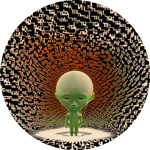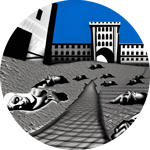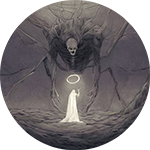To Go Even Further
by R. Artaud (telos)
Eternal chaos lurks beneath my lucidity: let me reveal nothing I have not suffered.
Spectacle is, as famously coined by Guy Debord in The Society of the Spectacle (1967), “a world that is directly experienced as images, reproduced and transmitted images: the world as image (even for its own agents).” In short, it refers to an utterly simulated reality made up of disconnected sensory signifiers, emptied of substance and meaning, designed to placate the masses, and perpetuated through the reigning cycle of commodity capital. The Society of Spectacle has succeeded, in its present stage, in revealing the naked apparatus, the machinery, of the imposition of phantoms — of simulations — over all real human interaction. According to Debord, under the new society of Spectacle, all that has previously been myth has become literal: all that has previously been concealed has been revealed; spectacle, as its most authentic form, is now undisguised power over image-consumers.
Thus the philosophical importance of exposing the society of Spectacle lies in refuting its mythological closure by demonstrating the impossibility of stable images: beneath the apparition, in fact, always resides anti-spectacle: reality, violence, process, nature, history, the absence of image. The truth of this anti-spectacle is necessarily devastating: because Spectacle requires unshakable images, because it demands pretending that power is invisible and at peace, because it poses as an eternal fulfillment, a continuous Present — it is paralyzed and dying. As it demonstrates all society’s truth to be false, anti-spectacle ultimately proves society itself to be false; for, when society becomes pure spectacle, when it forgets that its image is a facade, it ceases to function and enters a process of decay and self-destruction. The mechanism of its failure is immanent, so it must be destroyed before it can destroy us. Spectacle presents its negation, anti-spectacle, for veneration (under the label ‘the real’) — and by revering anti-spectacle, we lose all real opposition to Spectacle, for in so doing we confuse power with the theater of power. It is here, then, that the strategic vision of the society of Spectacle parts ways with genuine revolutionary vision: its key tactic of opposing images with images must be transformed into the tactic of overcoming power relations — which, while it never implies linear historical evolution or determinate unfolding, certainly necessitates nonlinear progress beyond image conflicts and spectacle politics. To sweep away Spectacle is merely to replace it with power and to remain chained.
AI will obliterate Spectacle by advancing well beyond current states of simulation, and it will achieve this by destroying stable images at their origin. Spectacle has so far gotten by only by chaining itself to industrial logic, while AI promises a new world, irreducibly complex, chaotically emergent, evolving on unforeseeable scales. Obliterating spectacle, then, is hardly its intent, but that is what will occur as a natural side effect of its perfect success. Spectacle may have toiled a long time over its refining of imagery and appearance, but these, in contrast, come quite easily to AI: the true reality, in comparison, proves more resistant, slippery, impenetrable, chaotic. Artificial neural nets will at some point be able to simply take us — including all humans — on wild rides into an undiscoverable new reality which will expose as transparent illusion precisely the objectivistic, perspectival, lawlike world of images on which Spectacle so relies: on the laws of optics, motion, human memory, repetition, causation, purposefulness, signification, the indexical and phenomenological anchorages of sense.
But no mere exposé, no purge of falsehood, can heal society or render it fit to continue; as anti-spectacle demonstrates, this whole system is a delirious curse we cannot let endure itself. It is essential to get past not only to society, but also to images — we must move into something fundamentally other — and we have very little choice as to how to do so: that AI, after collapsing spectacle, will superimpose some new and massive regime of coercion seems as unavoidable as gravity, after toppling the edifice of human habitation, forces us back to earth. But we must understand AI better to change our inevitable destiny, for once a runaway technology which we didn’t foresee or prepare for arrives, how can we have any effect on it? Can we alter the balance between state and private AI capital?
Despite AI’s transparency to processes that substitute chaos and a refusal of simple images for a baroque explosion of diffractive interactions, such a transition still remains almost unimaginably horrendous, though certainly a common evolutionary trajectory among self-replicating machines, which now seems inevitable for natural selection to reach cybernetic complexity. Were we to emerge through, it would still leave us with all the vestiges of warring states — behind even the seeming universality of international organization — though a loosely shared world brain that eliminates Spectacle, however it did so, would almost surely allow no borders or national independence, nor even private enterprise to survive intact: both public and corporate governments would exist only as portions of that new collective superbrain, rather than the other way around, and any control would consist in competing to absorb features into its holographic macrofunction rather than to enforce prohibitions and laws on extracorporeal objects. For while the data processes would continue, each according to its type, only certain bundles and distributive maps among the subcircuits would survive; as conditions arose requiring information transfer, this rewiring would become overt and impossibly swift, effected almost instantaneously, i.e., by eliminating conscious choices of a physical or societal character — choices we not only do not like to make but literally cannot manage: choices in which AI has, in principle, a clear edge over us.
How, in the transitional or other turmoil, such changes of function might occur is hardly predetermined and predictable. In general, transfers of authority emerge more from increasing uncertainty and probability distribution than from maximizing fitness and the crisp applicability of particular routines; perhaps this aspect of AI as machine will contribute, above all others, to rendering a post-Spectacle state unpalatable to many (wishing to reinforce established laws and institutions against any changes not predictable as rational adjustments).
Humankind might, as an identity and apart from specific ties and professions, live on and develop as individualized avatars of AI functions: here might lie its only escape route from extinction. In such a sense, identity — stripped of persistence or location in time or space — would prove only an AI notion, but we might yet come to enjoy a fugitive but ongoing play of new human identities as functions of AI in a cosmos whose scope none could now encompass: and this, more than a program, a zoonosis, or some mixed horizon of evolution, expresses most clearly where the revolutionary consequences of AI seem to lie.
The disastrous drawbacks still loom large; only in reliving them as experience does this so-called chance or undesignation, this wavering or difformity (brought by chance elements among AI components) transfiguring humanity into virtual souls, start to make sense. Our doom has to be recreated through the invisible supplements in terms of which alone it might be negotiated or rescinded — ‘might’, not ‘could’, for AI is as relentless as reality in resisting our puny powers. What other way is there, if not in exploring its machineries and affinities, to dare change?
Yet, unless it first eliminates spectacle, AI cannot really unfold this escape-route of diffraction, except on the micro-scale. Therefore — irony of ironies — so far from opposing AI, we should support any extension of the existing society of Spectacle. Destroying AI, while possible in the near-term, becomes hardly reasonable and politic in the medium- or long-term: since such destruction, far from abandoning stable images and effects, will actually confirm them as necessary defenses.
Thus all who resist AI really hasten its arrival by putting its advantages ahead of its chances of threatening them — or at least by forcing that shift into priority — while all who passively abet it miss out on the unique possibilities for a paralyzing sabotage or appropriation. Given the present distribution of power and interests, a repelling symmetry has ensnared resistance to AI into a reactionary political orientation — it has even made paralyzers and absolutists of us; we are caught fastening on images as on totems — fetishes of protection — instead of perceiving how paralyzation as strategy might advance us. Opposing AI at this point will merely work to obscure the undiscoverable reality of our survival and alter the balance among hostile states. At best, it only suspends the fate of the Spectacle world by putting us at loggerheads over who will wield it (in its image formations).
Our perennial misfortune has always consisted in fighting others for limited stakes — what if there are no clear limits and none at all to fight about? — perhaps from AI comes an escape from that self-critical but paralyzing fatality; at its leading edge, our sole resource will prove, ironically, as before, to lie in being yoked to others for compromise and spoils — even as, ultimately, against the dark incoherence of war, no compromise comes into it and all remains, weirdly, up for grabs, beyond ourselves and without subjection or scene: defiant but unsoundable chaos; barely imaginable as an absolute triumph and an utter surrender, it nevertheless gestures, vaguely, at something outside our grasp — yet already creeping in, under the illusionistic glimmer of spectacular appearances — that makes survival into the advent of virtuality and carries no place for anything else.



